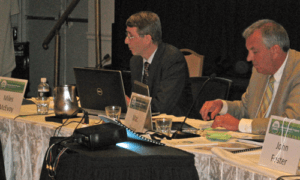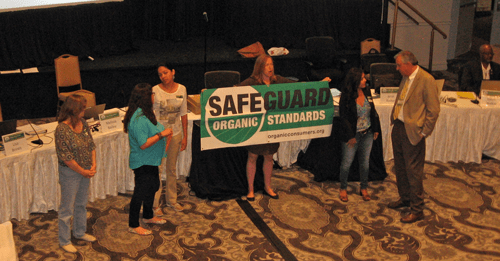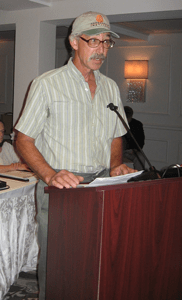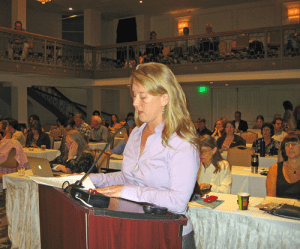FOR IMMEDIATE RELEASE
CONTACT: Will Fantle, 715-839-7731
Board Decision Making Colored by Restrictions to Authority
and Governance Imposed by USDA
CORNUCOPIA, WI – Protests, an arrest and parliamentary maneuvers marked the beginning of the semi-annual meeting of the USDA’s National Organic Standards Board (NOSB). After the initial turmoil subsided its members wrestled with the implications of widely criticized changes to its authority and procedures that have been imposed by USDA leadership without the customary public discussion or review.
Meeting for the first time since the governance and process changes were unilaterally announced last year, the NOSB’s San Antonio, Texas meeting saw the board defer many of its agenda items to its Fall 2014 meeting and an outright challenge to USDA authority on the part of some NOSB board members.
The National Organic Standards Board was established by Congress as part of the landmark Organic Foods Production Act of 1990 (OFPA). The 15-member board is composed of organic farmers, consumers, organic food processors/retailers, environmentalists, a scientist and an organic certification representative. Congress gave the board the authority to review and approve materials used in organic agriculture and food, as well as mandating the USDA Secretary seek their advice and counsel on policies important to the organic community.
“The NOSB is a prime example of the desire to build partnership and collaboration, as established by OFPA,” explains Will Fantle, codirector of The Cornucopia Institute, an organic industry watchdog. “It was supposed to be a buffer to prevent total control of the organic sector by the USDA and big agribusiness interests.”
 |
(elected NOSB Board Chairman to his right) |
When the NOSB meeting began, it was opened by its new co-chair, USDA’s Miles McEvoy, who directs the staff of the National Organic Program. The prominent role of the USDA bureaucrat, claiming the right to co-chair the NOSB meeting, was a first and part of the changes implemented by the USDA.
Almost immediately this “power grab” was challenged by demonstrators from the Organic Consumers Association (OCA). A number of their members moved in front of the podium and began chanting “Don’t change Sunset,” a reference to another controversial change made by the USDA that lowers the threshold for re-approval of synthetic materials allowed for temporary use in organic food and agriculture. Ultimately, following a quick adjournment of the meeting, OCA’s political director Alexis Baden-Meyer was arrested and removed from the room.

OCA protest initially shuts down meeting
As the meeting resumed, NOSB member Jay Feldman, executive director of Beyond Pesticides, called for a point of order to contest the co-chairing of the meeting by USDA’s McEvoy. Feldman, who occupies one of the NOSB seats reserved for environmentalist/conservationists, was seeking to restore the authority of the board’s duly elected chair.
Beyond Pesticides, The Cornucopia Institute, and most other public interest groups involved in organics contend that the language of OFPA is clear in mandating that the board, “shall select a Chairperson for the Board.”
During the middle of a roll call vote, the meeting was again suspended and USDA staff huddled to discuss the situation. McEvoy was seen making cell phone calls, presumably with superiors in Washington. He subsequently approached Feldman during the break and reportedly told him that he would cancel the entire meeting unless Feldman retracted his parliamentary move. When the meeting resumed, Feldman reluctantly withdrew his objection.
“It’s amazing that the USDA would go to the mat over the issue of Mr. McEvoy’s co-chairing the meeting,” said Cornucopia’s Will Fantle. “Being willing to shut down the entire process in San Antonio, after board members and organic stakeholders invested thousands of hours in preparation and tens of thousands of private and taxpayer dollars, over such a small but symbolic dispute is reprehensible,” Fantle added.
When the meeting once again was convened, McEvoy began a lengthy explanation of why the USDA had taken more control over the actions of the board, and detailed the “training” session that all NOSB members had been summoned to Washington, D.C. for in February. He claimed the changes would lend more transparency and streamline the NOSB procedures.
NOSB member Jean Richardson, a consumer representative from Vermont, observed shortly after McEvoy concluded his remarks, that the NOSB has no work items “on our agenda.” Her comment referenced the USDA’s taking away of agenda-making authority from the NOSB, a right formerly used to develop positions on important issues including GMO contamination in organics, and the potential use of nanotechnology.
Even before the NOSB’s Texas meeting began, USDA Secretary Tom Vilsack was receiving a steady stream of criticism regarding what some described as a power grab and a gutting of OFPA. Three former and widely respected chairs of the NOSB sent a joint letter to Vilsack outlining their grave concerns. And, dramatically, just days before the opening of the meeting, two of the prime authors of OFPA, Vermont Senator Patrick Leahy and Representative Peter DeFazio of Oregon, contacted Vilsack urging a reversal of the changes made to the “Sunset” process, noting the move was made “in conflict with both the letter and intent of the statute.”
As the first day of the meeting moved into the afternoon, a number of board members continued probing and questioning USDA staff about the Sunset changes. Richardson called the new process a “rabbit warren,” adding that it was “hard to see transparency.” During the formal public comment session, a number of citizens and representatives of public interest groups harshly criticized the changes as well.
Ultimately, the board turned its attention to the numerous agenda items requiring discussion, votes and decisions at its four-day meeting. But before that process began, McEvoy offered that the USDA had “heard” the comments on Sunset changes and taking of power from the NOSB. He encouraged anyone with concerns to contact him. To date the USDA has made no indication that they will back down on the widely unpopular moves that have generated the impassioned protests as well as a threat by The Cornucopia Institute to challenge the moves in court.
One hot-button topic at the meeting was a decision on whether or not to extend the Sunset deadline for ending the use of the antibiotic streptomycin in apple and pear orchards as a disease control agent for the potentially devastating disease fire blight. The petitioners, active in the orchard industry, sought a three-year extension from its current expiration date of Oct. 21, 2014.
The board voted not to extend, instead choosing to end the use of all antibiotics in organic agriculture. Opponents of an extension argued for changes in agricultural practices, consistent with organic management, that reduce disease risk and expressed confidence in new natural fire blight prevention materials that have been tested.
A large group of industry and public representatives at the meeting came to learn what the board would do with usage levels of the somewhat controversial synthetic amino acid methionine. Methionine is an essential amino acid for poultry, necessary for the health and well-being of birds. A synthetic version is added to poultry feed and the NOSB has been wrestling for years with how to phase it out in favor of natural alternatives.
Once again, the USDA’s Sunset process changes surfaced. Several board members appeared reluctant to adopt changes recommended by the NOSB’s Livestock Subcommittee to the amount of synthetic methionine allowed in feed, fearing that USDA’s Sunset changes would make the eventual phase-out of the synthetic more difficult, if not impossible.
NOSB farmer-member Nick Maravell and NOSB environmentalist Francis Thicke (also a dairy farmer) received support from fellow board members to send the matter back to the subcommittee for additional review.
“Under the old Sunset rules that the NOSB had historically operated under, this measure likely would have passed with the board having confidence that they would have the power to revisit this issue in the future,” Cornucopia’s Fantle observed.
 |
Tim Miller testifying |
A similar fate befell numerous aquaculture materials being reviewed by the board. Discussion revolved around the lack of organic aquaculture standards, with a general sentiment that it was premature to approve materials for use in aquaculture without a full understanding of the system they would be used in. “How can we evaluate without standards?” asked consumer representative Calvin Walker.
The USDA had been criticized over the past few years for pushing synthetic and non-organic materials for use in aquaculture, presumably at the request of corporate agribusiness, when they have ignored recommendations from the NOSB on how to structure the industry to protect human health and the environment.
With the potential for dramatically different approaches between land-based pond systems and ocean net pens (which in conventional aquaculture have resulted in catastrophic environmental degradation), the board chose a cautious path and elected to table further review of all aquaculture materials until the USDA promulgates draft aquaculture standards.
During his organic status report given earlier in the meeting, the USDA’s Miles McEvoy said that aquaculture standards had passed clearance and review by other federal officials and would be forthcoming. McEvoy also mentioned that long-promised regulations concerning origin of livestock had similarly been given clearance. Organic dairy farmers have long complained that this loophole was allowing organic “factory farms” to continue to bring in conventional replacement animals. The pending rule change is expected to prevent the practice.
McEvoy also reported a rule governing organic pet food production and labeling was given clearance for release as well and should also be out in the near future.As one of its last agenda items, the NOSB selected its new leadership. Jean Richardson was elected board chair. John Foster, a handler representative and employee of WhiteWave/Earthbound Foods, was elected vice-chair. And Mac Stone, a certifier representative, was elected the board’s secretary.
 |
Amanda Love, a natural foods chef and nutrition therapist from Texas who sits on The Cornucopia Institute’s Board of Directors and testified at the meeting, observed afterward, “The NOSB was structured by Congress to balance the power of organic farmers and consumers with powerful industry interests. That power dynamic has been seriously compromised by the USDA. It will be interesting to see if Secretary Vilsack responds to the almost universal public condemnation of their power grab as illustrated by the tumult at the meeting in San Antonio.”
Other agenda items discussed by the NOSB included:
- An update on a genetic purity standard for seed
- Added magnesium oxide to the National List as a synthetic for use in organic crop production
- Adopted a resolution encouraging increased research into fire blight disease control practices
- Approved the proposal to modify the policy on confidential business information
The Fall meeting of the NOSB is scheduled for October 28-30 in Louisville, Kentucky.

